|
|
|
Sort Order |
|
|
|
Items / Page
|
|
|
|
|
|
|
| Srl | Item |
| 1 |
ID:
127831
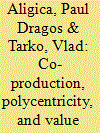

|
|
|
|
|
| Publication |
2014.
|
| Summary/Abstract |
Revisiting the theory of institutional hybridity and diversity developed by Vincent and Elinor Ostrom to cope with the challenge of the "neither states nor markets" institutional domain, this article reconstructs the Ostromian system along the "value heterogeneity-co-production-polycentricity" axis. It articulates the elements of a theory of value heterogeneity and of the fuzzy boundaries between private and public. It rebuilds the model of co-production, clarifying the ambiguity surrounding a key technical public choice theoretical assumption, and it demonstrates (a) why it should not be confused with the Alchian-Demsetz team production model and (b) how co-production engenders a type of market failure that has been neglected so far. In light of this analysis, the article reconsiders polycentricity, the capstone of the Ostromian system, explaining why polycentricity may be seen as a solution both to this co-production market failure problem and to the problems of social choice in conditions of deep heterogeneity. It also discusses further normative corollaries.
|
|
|
|
|
|
|
|
|
|
|
|
|
|
|
|
| 2 |
ID:
127846
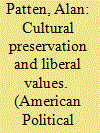

|
|
|
|
|
| Publication |
2013.
|
| Summary/Abstract |
William James Booth elaborates three main challenges to my social lineage account (Patten 2011). Conceptually, he finds the proposal to be question-beginning. Normatively, he thinks that it has objectionable implications. And, substantively, he claims that the proposal is unhelpful, in that it fails to explain a case of theoretical importance for multiculturalism. In this reply, I argue that each of these challenges misses the target. The social lineage account continues to offer a promising, nonessentialist basis for normative multiculturalism.
|
|
|
|
|
|
|
|
|
|
|
|
|
|
|
|
| 3 |
ID:
127829


|
|
|
|
|
| Publication |
2013.
|
| Summary/Abstract |
How are civilian attitudes toward combatants affected by wartime victimization? Are these effects conditional on which combatant inflicted the harm? We investigate the determinants of wartime civilian attitudes towards combatants using a survey experiment across 204 villages in five Pashtun-dominated provinces of Afghanistan-the heart of the Taliban insurgency. We use endorsement experiments to indirectly elicit truthful answers to sensitive questions about support for different combatants. We demonstrate that civilian attitudes are asymmetric in nature. Harm inflicted by the International Security Assistance Force (ISAF) is met with reduced support for ISAF and increased support for the Taliban, but Taliban-inflicted harm does not translate into greater ISAF support. We combine a multistage sampling design with hierarchical modeling to estimate ISAF and Taliban support at the individual, village, and district levels, permitting a more fine-grained analysis of wartime attitudes than previously possible.
|
|
|
|
|
|
|
|
|
|
|
|
|
|
|
|
| 4 |
ID:
127832
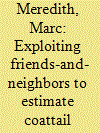

|
|
|
|
|
| Publication |
2013.
|
| Summary/Abstract |
Federalist democracies often hold concurrent elections for multiple offices. A potential consequence of simultaneously voting for multiple offices that vary with respect to scope and scale is that the personal appeal of candidates in a high-profile race may affect electoral outcomes in less salient races. In this article I estimate the magnitude of such coattail effects from governors onto other concurrently elected statewide executive officers using a unique dataset of county election returns for all statewide executive office elections in the United States from 1987 to 2010. I exploit the disproportionate support that candidates receive from geographically proximate voters, which is often referred to as the friends-and-neighbors vote, to isolate variation in the personal appeal of candidates. I find that a one-percentage-point increase in the personal vote received by a gubernatorial candidate increases the vote share of their party's secretary of state and attorney general candidates by 0.1 to 0.2 percentage points. In contrast, personal votes for a secretary of state or attorney general candidate have no effect on the performance of their party's gubernatorial candidate or other down-ballot candidates
|
|
|
|
|
|
|
|
|
|
|
|
|
|
|
|
| 5 |
ID:
127830
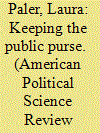

|
|
|
|
|
| Publication |
2013.
|
| Summary/Abstract |
It is widely believed that rents from windfall revenue undermine accountability. An enduring explanation is that windfalls free leaders from the need to tax, producing a quiescent population. Yet, there is little direct evidence of how windfalls and taxes affect citizen political action. I use novel revenue and information experiments to examine whether and why windfalls (compared to taxes) affect how citizens participate in politics. The experiments were embedded in a public awareness campaign conducted with 1,863 citizens in Indonesia. The results-from an original survey and postcard campaign-indicate that the tax treatment increased monitoring and anti-incumbent political action. Yet, when given spending information, citizens in the windfall treatment cared just as much about misused revenue as those in the tax treatment. The findings have important implications for understanding not only how revenue affects citizen political behavior but also how people acquire and process information on government spending
|
|
|
|
|
|
|
|
|
|
|
|
|
|
|
|
| 6 |
ID:
127824
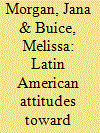

|
|
|
|
|
| Publication |
2013.
|
| Summary/Abstract |
This article outlines three theoretical arguments-socialization, status discontent, and elite cues-that generate competing predictions about the way context shapes gender attitudes. Using hierarchical analysis, we assess the power of these arguments in Latin America, a region that manifests considerable variation on our central explanatory variables and thus offers important theoretical leverage. We find men's gender attitudes to be highly contingent on elite cues and susceptible to backlash effects in response to women's economic advancement. Also, where women lack national representation, distrust of government promotes support for female leadership as an alternative to the discredited (male) establishment. The analysis supports existing individual-level explanations of gender attitudes and demonstrates a connection between diffuse democratic values and gender egalitarianism. The findings suggest that recent advances for female politicians in Latin America may be susceptible to reversal, and they illuminate strategies for strengthening women's equality in the region.
|
|
|
|
|
|
|
|
|
|
|
|
|
|
|
|
| 7 |
ID:
127842
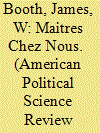

|
|
|
|
|
| Publication |
2013.
|
| Summary/Abstract |
Alan Patten's social lineage account of cultural continuity is the most recent effort to provide multicultural theory with a non-essentialist concept of culture, its continuity and loss that meets broadly liberal normative desiderata. In this essay, I argue that it too fails to offer an alternative to essentialism, to meet standard liberal normative stipulations, and to construct a theory of continuity sufficient to underpin the present claims of involuntarily incorporated communities. That result is theoretically interesting for it shows the deep intractability of the problems at the core of liberal multiculturalism.
|
|
|
|
|
|
|
|
|
|
|
|
|
|
|
|
| 8 |
ID:
127822
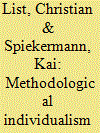

|
|
|
|
|
| Publication |
2013.
|
| Summary/Abstract |
Political science is divided between methodological individualists, who seek to explain political phenomena by reference to individuals and their interactions, and holists (or nonreductionists), who consider some higher-level social entities or properties such as states, institutions, or cultures ontologically or causally significant. We propose a reconciliation between these two perspectives, building on related work in philosophy. After laying out a taxonomy of different variants of each view, we observe that (i) although political phenomena result from underlying individual attitudes and behavior, individual-level descriptions do not always capture all explanatorily salient properties, and (ii) nonreductionistic explanations are mandated when social regularities are robust to changes in their individual-level realization. We characterize the dividing line between phenomena requiring nonreductionistic explanation and phenomena permitting individualistic explanation and give examples from the study of ethnic conflicts, social-network theory, and international-relations theory.
|
|
|
|
|
|
|
|
|
|
|
|
|
|
|
|
| 9 |
ID:
127833
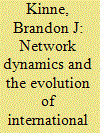

|
|
|
|
|
| Publication |
2013.
|
| Summary/Abstract |
Cooperation helps states realize mutual gains, but mistrust and disagreements over institutional design inhibit cooperation. This article develops a network explanation for how states achieve cooperation in the face of persistent coordination and collaboration problems. The analysis focuses on bilateral cooperation agreements, a vast body of treaties spanning multiple issue areas. Bilateral agreements constitute an evolving network of cooperative ties. This network defines the strategic environment in which states bargain over new agreements, endogenously influencing subsequent bilateral endeavors by revealing strategically valuable information about states' trustworthiness and preferences over institutional design, while also generating externalities that incentivize bilateral partnerships. Inferential network analysis shows that states are more likely to create bilateral agreements if they (1) share agreements with common third parties, (2) accede to more agreements in general, and/or (3) share important exogenous characteristics with current bilateral partners. These network dynamics drive bilateral cooperation in everything from commodities to cultural exchange to fisheries.
|
|
|
|
|
|
|
|
|
|
|
|
|
|
|
|
| 10 |
ID:
127827


|
|
|
|
|
| Publication |
2013.
|
| Summary/Abstract |
Do big cities exert more power than less populous ones in American state legislatures? In many political systems, greater representation leads to more policy gains, yet for most of the nation's history, urban advocates have argued that big cities face systematic discrimination in statehouses. Drawing on a new historical dataset spanning 120 years and 13 states, we find clear evidence that there is no strength in numbers for big-city delegations in state legislatures. District bills affecting large metropolises fail at much higher rates than bills affecting small cities, counties, and villages. Big cities lose so often because size leads to damaging divisions. We demonstrate that the cities with the largest delegations-which are more likely to be internally divided-are the most frustrated in the legislative process. Demographic differences also matter, with district bills for cities that have many foreign-born residents, compared with the state as a whole, failing at especially high rates.
|
|
|
|
|
|
|
|
|
|
|
|
|
|
|
|
| 11 |
ID:
127836
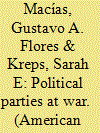

|
|
|
|
|
| Publication |
2013.
|
| Summary/Abstract |
What determines when states adopt war taxes to finance the cost of conflict? We address this question with a study of war taxes in the United States between 1789 and 2010. Using logit estimation of the determinants of war taxes, an analysis of roll-call votes on war tax legislation, and a historical case study of the Civil War, we provide evidence that partisan fiscal differences account for whether the United States finances its conflicts through war taxes or opts for alternatives such as borrowing or expanding the money supply. Because the fiscal policies implemented to raise the revenues for war have considerable and often enduring redistributive impacts, war finance-in particular, war taxation-becomes a high-stakes political opportunity to advance the fiscal interests of core constituencies. Insofar as the alternatives to taxation shroud the actual costs of war, the findings have important implications for democratic accountability and the conduct of conflict.
|
|
|
|
|
|
|
|
|
|
|
|
|
|
|
|
| 12 |
ID:
127837
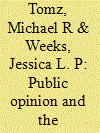

|
|
|
|
|
| Publication |
2013.
|
| Summary/Abstract |
One of the most striking findings in political science is the democratic peace: the absence of war between democracies. Some authors attempt to explain this phenomenon by highlighting the role of public opinion. They observe that democratic leaders are beholden to voters and argue that voters oppose war because of its human and financial costs. This logic predicts that democracies should behave peacefully in general, but history shows that democracies avoid war primarily in their relations with other democracies. In this article we investigate not whether democratic publics are averse to war in general, but whether they are especially reluctant to fight other democracies. We embedded experiments in public opinion polls in the United States and the United Kingdom and found that individuals are substantially less supportive of military strikes against democracies than against otherwise identical autocracies. Moreover, our experiments suggest that shared democracy pacifies the public primarily by changing perceptions of threat and morality, not by raising expectations of costs or failure. These findings shed light on a debate of enduring importance to scholars and policy makers.
|
|
|
|
|
|
|
|
|
|
|
|
|
|
|
|
| 13 |
ID:
127834


|
|
|
|
|
| Publication |
2013.
|
| Summary/Abstract |
How do global sources of information such as mass media outlets, state propaganda, NGOs, and national party leadership affect aggregate behavior? Prior work on this question has insufficiently considered the complex interaction between social network and mass media influences on individual behavior. By explicitly modeling this interaction, I show that social network structure conditions media's impact. Empirical studies of media effects that fail to consider this risk bias. Further, social network interactions can amplify media bias, leading to large swings in aggregate behavior made more severe when individuals can select into media matching their preferences. Countervailing media outlets and social elites with unified preferences can mitigate the effect of bias; however, media outlets promulgating antistatus quo bias have an advantage. Theoretical results such as these generate numerous testable hypotheses; I provide guidelines for deriving and testing hypotheses from the model and discuss several such hypotheses.
|
|
|
|
|
|
|
|
|
|
|
|
|
|
|
|
| 14 |
ID:
127835
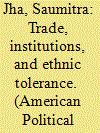

|
|
|
|
|
| Publication |
2013.
|
| Summary/Abstract |
I provide evidence that the degree to which medieval Hindus and Muslims could provide complementary, nonreplicable services and a mechanism to share the gains from exchange has resulted in a sustained legacy of ethnic tolerance in South Asian towns. Due to Muslim-specific advantages in Indian Ocean shipping, interethnic complementarities were strongest in medieval trading ports, leading to the development of institutional mechanisms that further supported interethnic exchange. Using novel town-level data spanning South Asia's medieval and colonial history, I find that medieval ports, despite being more ethnically mixed, were five times less prone to Hindu-Muslim riots between 1850 and 1950, two centuries after Europeans disrupted Muslim overseas trade dominance, and remained half as prone between 1950 and 1995. Household-level evidence suggests that these differences reflect local institutions that emerged to support interethnic medieval trade, continue to influence modern occupational choices and organizations, and substitute for State political incentives in supporting interethnic trust
|
|
|
|
|
|
|
|
|
|
|
|
|
|
|
|
|
|
|
|
|